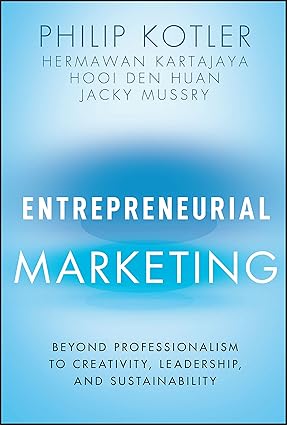Expanded White Paper: Entrepreneurial Marketing: Beyond Professionalism to Creativity, Leadership, and Sustainability
Introduction
This expanded white paper delves into the core concepts presented in Philip Kotler's Entrepreneurial Marketing: Beyond Professionalism to Creativity, Leadership, and Sustainability. It aims to provide a comprehensive exploration of the principles and strategies outlined in the book, offering insights into how businesses can foster innovation, build strong leadership, and achieve long-term sustainability.
Key Themes from the Book
- Creativity and Innovation: The book emphasizes the importance of creativity in driving business growth and differentiation. It explores techniques for fostering a creative culture and generating innovative ideas.
- Leadership and Vision: Effective leadership is essential for entrepreneurial success. The paper discusses the qualities of entrepreneurial leaders, their role in setting a vision, and their ability to inspire and motivate teams.
- Sustainability: Sustainability is increasingly a key consideration for businesses. The paper examines the principles of sustainable marketing, including environmental responsibility, social impact, and economic viability.
Expanding on the Concepts
1. Creativity and Innovation
- Design Thinking: Explore the application of design thinking methodologies in entrepreneurial marketing, focusing on user-centered problem-solving and rapid prototyping.
- Open Innovation: Discuss the benefits of collaborating with external partners to generate innovative ideas and accelerate product development.
- AI and Machine Learning: Examine how AI and machine learning can be leveraged to enhance creativity and innovation, such as personalized marketing and predictive analytics.
2. Leadership and Vision
- Emotional Intelligence: Delve into the role of emotional intelligence in effective leadership, highlighting the importance of self-awareness, empathy, and relationship management.
- Agile Leadership: Discuss the principles of agile leadership and how they can be applied to foster adaptability, collaboration, and continuous improvement.
- Corporate Social Responsibility (CSR): Explore the role of leadership in driving CSR initiatives and how CSR can contribute to a company's long-term success.
3. Sustainability
- Circular Economy: Examine the principles of the circular economy and how businesses can adopt circular business models to reduce waste and promote sustainability.
- Ethical Marketing: Discuss the ethical implications of marketing practices and the importance of transparency, honesty, and respect for consumers.
- Measuring Sustainability Performance: Explore key metrics for measuring sustainability performance and how businesses can track and improve their environmental and social impact.
References
- Kotler, Philip, Hermawan Kartajaya, Hooi Den Huan, and Jacky Mussry. Entrepreneurial Marketing: Beyond Professionalism to Creativity, Leadership, and Sustainability. Wiley, 2020.
- Drucker, Peter F. Innovation and Entrepreneurship. HarperBusiness, 1985.
- Christensen, Clayton M. The Innovator's Dilemma. HarperBusiness, 1997.
- Goleman, Daniel. Emotional Intelligence: Why It Can Matter More Than IQ. Bantam Books, 1995.
- Kotler, Philip, and Nancy Lee. Corporate Social Responsibility: A Marketing Approach. Wiley, 2011.
- Porter, Michael E., and Mark R. Kramer. "Creating Shared Value." Harvard Business Review, January-February 2011.
- McDonough, William, and Michael Braungart. Cradle to Cradle: Remaking the Way We Make Things. North Point Press, 2002.
- Kotler, Philip, and Kevin Lane Keller. Marketing Management. Pearson, 2016.
- Kotler, Philip. Marketing 4.0: Moving from Traditional Marketing to Digital Marketing. Pearson, 2016.
Note: This is a preliminary list of references. Additional sources may be added as the white paper is developed. Contact ias-research.com and Keencomputer.com for further details.



